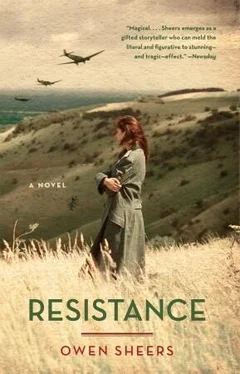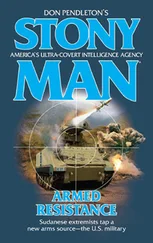“This has come from the top. Reichsführer SS Himmler. All of these special patrols have. The Führer himself is aware too. They both place great importance upon such missions. For the future of the Reich. In this case a suitably qualified officer could not be located within the SS. You, on the other hand, have all the necessary qualifications, as you can see. So to answer the question you were about to ask, that is why.”
Albrecht tried to imagine what bargaining had gone on between the Wehrmacht and the SS over this. Relations between the two organisations had been deteriorating ever since the end of the Russian campaign when the commanders of both had begun to detect the scent of victory. No doubt he was a chip bartered in a broader game. For the Wehrmacht to give him and his patrol up now, when the whole force of the invasion armies was being called upon, was quite something. For the SS to ask for a Wehrmacht officer to take on one of its own missions was unheard-of. For that officer to then be given the pick of the transport pool was most remarkable of all. Many Wehrmacht companies were already dependent upon captured or requisitioned British and American vehicles among their units.
However unorthodox the order, at least he’d been right about not joining the offensive on London. Those first few days had been a real relief, for him and his men. To be taken away from the front, away from the fighting units. But since then their journey had been far from easy. Over a month of stop-start travelling, edging along behind the advancing front like a shoal of fish swimming in the wake of a whale. Several times they’d been drawn into the fighting, through necessity, as local commanders fended off enemy probes and counterattacks. His men had accounted themselves well on these occasions. The reports about young Steiner had been accurate. They’d all kept their heads, fought well. Nothing too foolhardy or panicked. Sebald had been as active as he always was, bandaging and plugging, trying to hold the pieces of men together under fire. Otto remained as silent as ever.
These moments of fighting had helped pull the patrol together. Experiencing the intensity of battle among unknown divisions and companies crystallised their identity as a group apart from the general flow of events. They were like a wandering band of players, a strangely privileged gang of vagabonds, the SS slip in Albrecht’s pocket always giving them licence and access. Suddenly they seemed to be moving through the war, not with it. Weaving through its veins and capillaries of supply lines and temporary locations rather than being pushed along at its vanguard, pressed against the enemy by the weight of it behind them.
They could never escape it completely, though. Even when they were travelling deeper behind the front through the newly occupied territories, the violence still stalked them. Insurgents were becoming active across the country, often once the fighting units had moved on and been replaced by the softer occupation divisions. Albrecht had witnessed the unearthing of such a resistance group himself, in the countryside outside Oxford. The city itself had fallen quickly. “The English would rather give up their women than lose their precious buildings,” Albrecht had heard one lieutenant remark. But outside the city sabotage activity had been increasing since its occupation. The railway dynamited; a high-ranking officer assassinated as he strolled on a village green. When they’d caught the men responsible they’d brought them to this same village green, an oak tree at its centre, the delicate shadow of a church’s spire falling across the closely mown grass. Albrecht watched the prisoners marched out under guard, stepping a slug’s pattern of footsteps through the shining dew. Five men. The oldest looked over sixty, the youngest less than twenty. They’d been beaten. Two of them carried another. They wore khaki dungarees over their civilian clothes.
A Gestapo officer looked on as the captain gave a brief account of these men’s crimes. An interpreter shouted his words to a small crowd, forced to watch, ringed by soldiers. Then the captain took a step back and nodded to the sergeant at his side, who in turn nodded to the two soldiers standing behind him. These soldiers walked forward to face the bowed heads of the five men lined up under the tree. Cocking their guns with one simultaneous slide and click, they machine-gunned them with a tight left and right spray. The spattering sound of the bullets rang off the Cotswold stone of the surrounding cottages and the sturdy walls of the church. As the soldiers lowered their weapons the echoes of the execution faded on the air. The men, who had been standing so still beneath the oak tree, jerked violently before collapsing, like puppets whose strings had been randomly yanked and then cut. A woman in the crowd fainted. Another howled, clawing at her face with her nails.
Later that morning the captain who’d organised this execution took the Gestapo officer and Albrecht to inspect the buried base of the resistance group. He’d led them through a wood on a small hill. “This rabbit hole?” he’d said as they approached the trees, pointing towards a root-fringed hollow with his cane. “An observation slot. See how good the view is from here?” He turned and looked over the landscape, the oxbow of the river, the railway embankments slicing through the fields. “Very clever,” he said. “Very clever indeed.”
Inside the wood a couple of guards had cleared the leaves from a patch of ground. As they got nearer Albrecht saw that the thin grass was deeply scored with a neat square, as if a heavy box had been there for months. The captain nodded to one of the guards who bent behind a tree as if to pick something up. To Albrecht’s surprise the scored square slowly swung open, revealing the soft whirr of a dropping counterweight and the rungs of a ladder descending into a narrow brick-lined shaft. After a couple of seconds the whirring stopped, leaving the patch of turf suspended at an angle above the opening. The captain was obviously pleased with his little show. “Please, gentlemen,” he said. “After you. But be careful, that ladder is still slippery.”
There was barely room inside for the three men to move around, but the captain was determined to give his guests a full tour of his discovery. “The first, I am told?” he said, raising his eyebrows in inquiry to the Gestapo officer. “In England. No doubt there will be more, of course, but this is the first we’ve found. Yes, the first.” He repeated this confirmation quietly, as if reminding himself of the honour his statement implied. Albrecht and the Gestapo officer followed him as he moved about the base pointing out various features. Chippings of coke in the paintwork to absorb moisture; a deep steel tray at the foot of the ladder to catch and contain the blast of a grenade dropped down the shaft; ammo store; wireless position; an angled escape tunnel (blocked by his men in the process of the capture); six thin bunks piled three high along each side of a narrow chamber off the main area. “These,” the captain said, tapping a row of glass jars glowing faintly yellow in the lamplight, “are filled with the insurgents’ own urine. I believe they thought they could use it to confuse the dogs.” He flashed Albrecht a quick smile. “It didn’t work, of course.”
Of course. It was always of course with these party men. The captain, Albrecht could tell, had not always been a soldier. A merchant perhaps, a shopkeeper whose wife had left him. A cowed individual until membership of the Party straightened his back, put steel back in his nerves. A failed application to the SS, no doubt. He certainly relished his chance to impress a Gestapo officer. Whether he had or not was difficult to say. The Gestapo man remained silent throughout the tour of the bunker. Between his silence and the captain’s verbosity, Albrecht had felt suffocated, trapped. When they’d emerged back into the bright day filtered through the branches of the wood, he’d breathed deeply, anxious to fill his lungs with nature, with all that did not change. The damp musk of the mouldering leaves, the tang of the breeze already sharpening towards winter. The new air made him feel better, and as they’d walked out of the wood he’d tried to draw the Gestapo officer on his thoughts. The man carried on looking ahead from under the low peak of his cap as they strode across the field, wearing his assumed authority like an invisible armour. “Interesting,” he’d said at last. Albrecht could sense the captain behind them, trying to catch up to listen. “Very well built. Better than anything we’ve seen before. But then of course the British have had a long time to prepare for this day.”
Читать дальше












